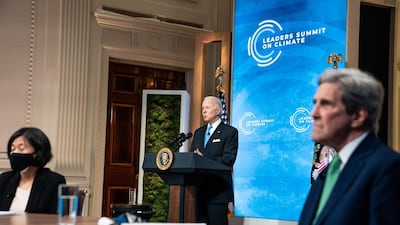President Joe Biden on Friday wrapped up a two-day climate change summit that yielded new emissions-cut pledges from the US, Canada, Japan and others, as well as the launch of an agricultural initiative from the UAE.
Mr Biden called the meeting with 40 world leaders to declare the US back at the climate leadership table after his predecessor, Donald Trump, pulled out of the 2015 Paris agreement to curb the release of planet-heating gases and loosened emissions rules.
The Democratic president, who returned the US to the Paris deal, unveiled a US target to cut emissions by 50-52 per cent by 2030 compared with 2005 levels. Japan and Canada also increased their targets.
“Over the last two days, I think we made some important progress,” Mr Biden said while closing the event.
“The commitments we've made must become real. Commitments without us doing that, it’s just a lot of hot air.”
Mr Biden tied efforts to fight climate change with job creation in clean-energy sectors, saying action was good for the economy in a bid to counter sceptics and conservatives who fear that climate regulations will slow growth.
The White House aims to ensure the world meets a goal of limiting planetary warming to 1.5°C compared to pre-industrial levels — even as activists and some UN climatologists say we are badly off-track.
The planet has so far warmed by 1.2°C and is headed for at least 3°C this century. Around the world, farmers are already struggling with increasingly frequent droughts, flash floods and desertification.
UAE Vice President and Ruler of Dubai Sheikh Mohammed bin Rashid on Friday told the summit of a joint scheme of the UAE, Britain, the US and others to help farmers in poor nations cope with the impacts of climate change.
He described a “group of champions to launch the agricultural innovation mission for climate … a new initiative to support research and development and innovation for food systems over the next five years.”
The UAE has over the decades developed know-how in water management, irrigation techniques and using its arid soils for agriculture.
Microsoft co-founder and philanthropist Bill Gates praised the initiative, saying smallholder and subsistence farmers across the developing world were on the front lines of a warming planet.
“We have to address the climate impacts that are going to come because of the heating that’s already taken place,” said Mr Gates.
“This means accelerating agricultural innovation so that subsistence farmers can withstand the shocks that come with more unpredictable weather.”
The billionaire also said he was working with partners on the Breakthrough Energy Catalyst scheme to raise money from governments, philanthropists, and companies to make capital investments to bring down the cost of clean technology.
Israeli Prime Minister Benjamin Netanyahu said Israel was cutting back on coal, developing energy-storage technology and cooperating with the UAE and Bahrain, which last year inked the Abraham Accord to normalise ties after decades of hostility.
“Cooperation in the fields of water and renewable energy are also an integral part of our new cooperation with the UAE and Bahrain,” Mr Netanyahu said.
“So not only are we working to end dependency on fossil fuels, and finding solutions to the climate crisis, but we're helping to cement Arab-Israeli peace. And that bodes well for the entire region, for the entire world.”
Other leaders to address the summit on Friday included Danish Prime Minister Mette Frederiksen, Kenyan President Uhuru Kenyatta and Vietnamese President Nguyen Xuan Phucare.
Still, there was criticism from teenage Swedish climate activist Greta Thunberg, former Irish president Mary Robinson and others that the pledges were not ambitious enough to meet the planet’s pressing needs.
“President Biden’s summit is a welcome step towards effective international cooperation, but all major powers must do a lot more, a lot quicker in concert if we are to avert environmental catastrophe,” said Ms Robinson, chairperson of The Elders group of political luminaries.
Pledges by Japan and the US to nearly double their 2030 emissions reduction targets were “still far from what science and equity demands”, said Ms Robinson, adding that China should strengthen its plans ahead of the next climate summit in Scotland in November.
Also taking part were US Transportation Secretary Pete Buttigieg, Trade Representative Katherine Tai, Commerce Secretary Gina Raimondo and Energy Secretary Jennifer Granholm, who called clean technology “our generation's moonshot”.


